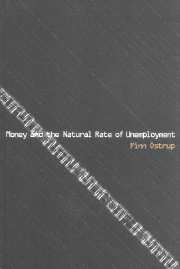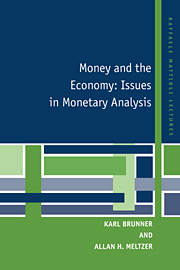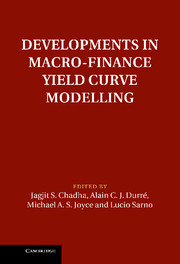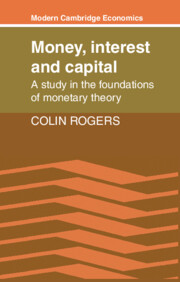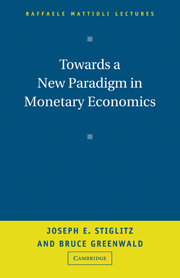
Towards a New Paradigm in Monetary Economics
£42.99
Part of Raffaele Mattioli Lectures
- Authors:
- Joseph Stiglitz, Columbia University, New York
- Bruce Greenwald, Columbia University, New York
- Date Published: September 2003
- availability: Available
- format: Paperback
- isbn: 9780521008051
£
42.99
Paperback
Other available formats:
Hardback, eBook
Looking for an inspection copy?
This title is not currently available on inspection
-
Towards a New Paradigm for Monetary Economics presents a pioneer treatment of critical topics in monetary economics. Unlike the prevailing monetary theory, this book focuses not on the role of money in facilitating transactions, but on the role of credit in facilitating economic activities more broadly. The 'new paradigm' emphasizes the demand and supply of loanable funds, which in turn requires the understanding of the imperfections of information and the role of banks. One enlightening view is that credit is quite different from other commodities in the sense that the former is based on information and default risk. The book consists of two parts. The first part develops a basic model of credit based on banks' portfolio choices. The second part is dedicated to the policy implications, among which are the liberalization of financial markets, the East Asian Crisis, the 1991 US recession and the subsequent recovery.
Read more- Stiglitz is one of the world's most highly regarded yet controversial and high profile economists, recently Senior Vice President of World Bank and Winner of the 2001 Nobel Prize for Economics
- Outlines new approach to monetary economics
- Important policy implications
Awards
- Professor Joseph E. Stiglitz is the winner of the 2001 Nobel Prize for Economics
Reviews & endorsements
'… recommended reading for all monetary economists and practitioners alike.' International Affairs
See more reviews'Overall this is an excellent contribution to our understanding of the functioning of modern financial markets. It will become essential reading for students, researchers, practitioners and policy-makers with an interest in the behaviour of monetary and financial systems.' Journal of International Development
Customer reviews
Not yet reviewed
Be the first to review
Review was not posted due to profanity
×Product details
- Date Published: September 2003
- format: Paperback
- isbn: 9780521008051
- length: 344 pages
- dimensions: 216 x 139 x 23 mm
- weight: 0.488kg
- availability: Available
Table of Contents
Introduction
Part I. Theory:
1. Reflections on the current state of monetary economics
2. How finance differs
3. The ideal banking system
4. Restricted banking
5. Market equilibrium
6. From the corn economy to the monetary economy
7. Towards a general equilibrium theory of credit
Part II. Applications:
8. Monetary policy
9. Regulatory policy and the new paradigm
10. Financial market liberalization
11. Restructuring the banking sector
12. Regional downturns and development of monetary policy
13. The East Asia Crisis
14. The 1991 US recession and the recovery
15. The new paradigm and the new economy
16. Concluding remarks.
Sorry, this resource is locked
Please register or sign in to request access. If you are having problems accessing these resources please email lecturers@cambridge.org
Register Sign in» Proceed
You are now leaving the Cambridge University Press website. Your eBook purchase and download will be completed by our partner www.ebooks.com. Please see the permission section of the www.ebooks.com catalogue page for details of the print & copy limits on our eBooks.
Continue ×Are you sure you want to delete your account?
This cannot be undone.
Thank you for your feedback which will help us improve our service.
If you requested a response, we will make sure to get back to you shortly.
×
